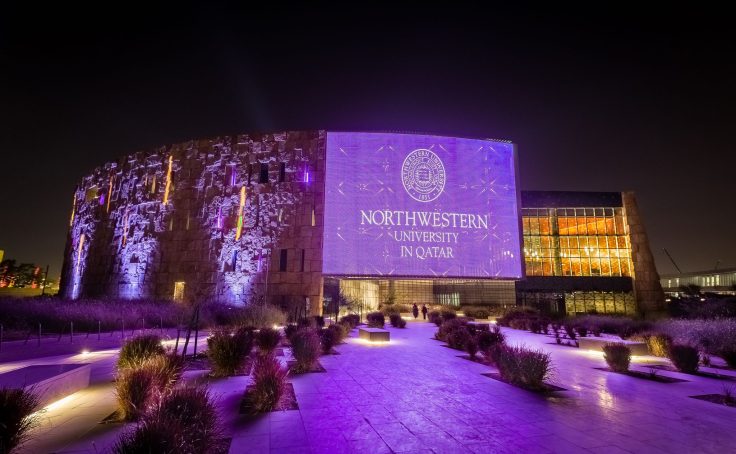Andrew Mills helped craft NU-Q’s journalism curriculum and now serves as Reuters deputy Gulf bureau chief

A former Northwestern Qatar professor who helped craft the school’s journalism curriculum and now leads Reuters’s Gulf coverage once described freedom of expression as “contextual,” a resurfaced video shows.
As the Daily Q interviewed students and faculty in 2018 about their opinions on freedom of speech and freedom of expression, most stressed the importance of those rights. Andrew Mills, the assistant journalism professor in residence, provided a more pessimistic take.
“I think freedom of expression is contextual, and I think it shouldn’t be thought of as a sort of absolute state of being,” Mills said. “Freedom of expression, it depends on the context that you’re in.”
Mills’s comments are particularly striking given the leadership role he took on at Northwestern Qatar—and the one he took on after leaving the school.
According to his LinkedIn profile, Mills led “development of NU-Q’s new journalism curriculum (launched August 2016),” helped develop “NU-Q’s first executive education and graduate programs,” and served on “committees that shaped curricula and university policies.” He was also awarded “a $50,000 Provost’s Digital Learning Fellowship to develop interactive multimedia case studies on ethics and media leadership,” according to the profile.
Mills left Northwestern in 2019 after working for the university for nearly nine years. He joined Reuters in 2021 and recently became the outlet’s deputy bureau chief for the Gulf, a role in which he writes and helps manage Reuters’s coverage of the Middle East from his home in Doha. In March, Mills covered Tucker Carlson’s interview with Qatari prime minister Sheikh Mohammed bin Abdulrahman Al Thani, who warned that an attack on Iran’s nuclear program would leave the Gulf with “no water, no fish, nothing” and trigger a “war that will spread all over the region.” Neither prediction came true, though Mills covered them uncritically.
Mills also published an interview with Hamas’s “leader-in-exile Khaled Meshaal,” a target of Israel’s recent strike targeting Hamas leaders in Doha who helped orchestrate the terror group’s Oct. 7 massacre. Meshaal told the outlet Hamas “would rise ‘like a phoenix’ from the ashes despite heavy losses during a year of war with Israel.”
Seth Stern, the director of advocacy for the Freedom of the Press Foundation, a nonprofit that monitors press freedom violations, found Mills’s free speech comments “alarming.”
“Journalists depend on the freedom of expression to serve their role as government watchdogs, which is what the First Amendment contemplates,” he told the Washington Free Beacon.
“His statement was almost too vague to be right or wrong,” Stern said, “but what bothers me about it is that his immediate instinct, when being asked about freedom of expression, was to hem and haw rather than say outright that, to journalists, freedom of expression is the lifeblood of the profession.”
A Northwestern spokesperson said Mills’s comments do not represent the university’s views. A Reuters spokesperson defended Mills’s remark, saying he “was speaking as an academic” and “commenting from a global perspective on countries where freedom of speech and expression is not always protected under the law.”
That’s certainly true in Qatar, where the Hamas-allied regime criminalizes statements and social media posts criticizing it. For NU-Q journalism students, that has meant being jailed for tweets and prevented from reporting, even within the glitzy gates of Education City, the area within Doha where U.S. universities are located.
That didn’t seem to bother Mills, who worked at Northwestern Qatar from 2011 to 2019 as the school’s contract with the Gulf state required students and faculty members to comply with those laws. In its 2015 annual report, the school made a commitment to “consider how we might connect with Qatar’s grand strategy for communication.”
That commitment may have renewed interest in the wake of Oct. 7. Two weeks after Hamas’s Oct. 7 massacre, staffers with the Qatar Foundation, the nonprofit organization chaired by the emir of Qatar’s mother that bankrolls Northwestern’s presence in the Gulf state, emailed the branch campus’s dean talking points on “diplomatic role and mediation efforts in Palestine/Gaza and Afghanistan, congressional investigators found.”
For more than a decade, Northwestern Qatar also held a partnership with Al Jazeera—a mouthpiece for both Doha and Hamas—involving joint research and education programs, training workshops, and internships. Northwestern Qatar ended its relationship with Al Jazeera in October 2024 after Schill faced congressional scrutiny over its ties to the terror-tied outlet.
Al Jazeera isn’t Northwestern Qatar’s only connection to Hamas. Ibrahim Abusharif, a journalism professor with the school for more than 17 years, cofounded the Quranic Literacy Institute and served as its treasurer from 1990 to 1998. The group purportedly worked to “translate and publish sacred Islamic texts,” but actually raised and laundered money for Hamas and was forced to pay damages to the family of a teenaged terror victim.

















